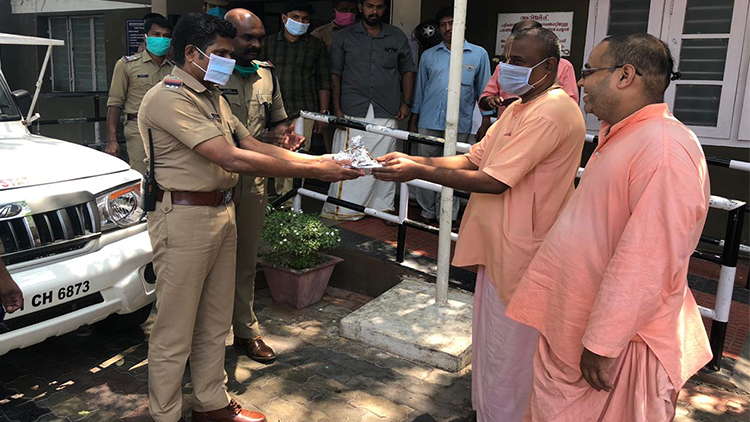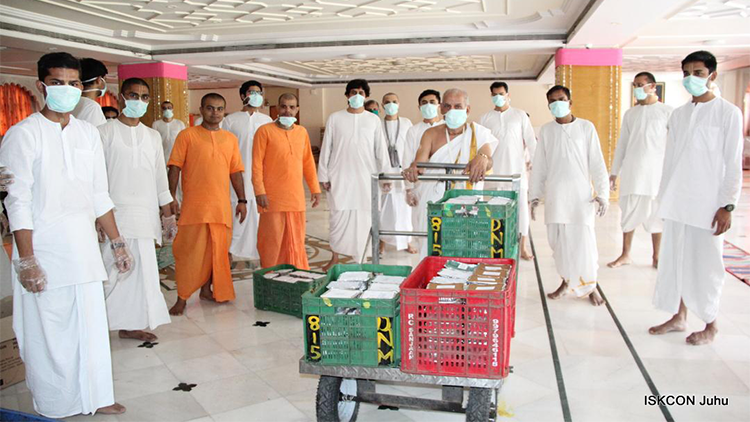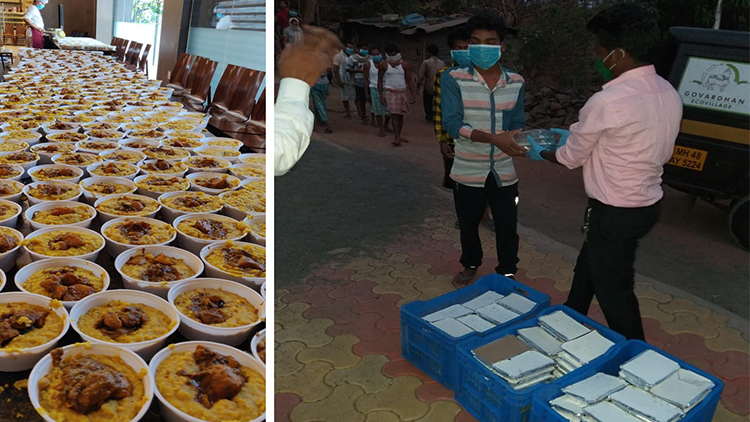ISKCON India Distributes Over 1 Million Plates of Prasad During COVID-19 Lockdown
By Madhava Smullen | Апр 03, 2020

With India in a 21-day Coronavirus lockdown, ISKCON temples have stepped up to feed the needy in cooperation with the Indian government, distributing over one million plates of prasad so far.
The government began with a quarantine in 79 districts across India recognized as COVID-19 hotspots, before officially locking down the entire nation – 1.3 billion people – on March 24th in a bid to stop the spread of the virus.
As in many other parts of the world, people have been advised to stay in their homes apart from trips to buy groceries or other essential commodities, and all factories, places of worship and non-essential markets and shops are now closed.
According to Vaishnavi Chandrashekhar, writing for sciencemag.org, “Millions of Indians who depend on each day’s wages for their daily meal were thrown out of work. Migrant workers packed buses and trains home, potentially taking the virus into rural areas. And as transport options dried up, many families in New Delhi and other major cities simply began to walk to their distant villages, with little access to food.”
To stop migrant workers spreading the virus, the government put those crossing state borders in a fourteen-day quarantine, providing them with accommodation and two meals a day. To help feed these migrant workers as well as other needy people, a number of ISKCON temples stepped up, with the Ministry of Home Affairs connecting them with local district administrations.
So far, twenty-one ISKCON temples are participating, including Delhi, Juhu and Chowpatty in Mumbai, Govardhan Eco Village, Kanpur, Trivandrum, Visakhapatnam, Hyderabad Farm, Baroda, Ahmedabad, and Lucknow.

Devotees with packed prasad in ISKCON Juhu, Mumbai
ISKCON began by distributing 60,000 plates of prasad a day, and gradually expanded the operation, reaching a high of 400,000 plates in one day on April 1st. Over one million plates have been distributed in total since the effort kicked off.
Because all temples are also under lockdown, prasad is cooked on the temple premises by resident devotees only, who follow strict hygiene and social distancing measures themselves.
“As soon as the vegetables come in to the temple, we first wash them in hot water with salt,” says ISKCON Communications director Yudhistir Govinda Das. “We also wash all vessels twice a day with soap and water.”
“And we make sure to use all hygiene standards and wear masks, gloves and caps while cooking as well as packing prasad packets,” adds Govardhan Eco Village Director Gauranga Das.
In many cases, local government agencies provide ISKCON temples with food grains, and handle the prasad distribution for them too.
Some temples however, such as Delhi, Baroda, Ahmedabad, Visakhapatnam, and Trivandrum, take care of distribution themselves, organizing congregation members and volunteers living outside the temple to do it so that the distribution team remains separate from the inhouse resident devotees.
Yudhistira Govinda describes the process at Delhi’s Dwarka kitchen, ISKCON’s largest in the country, which handles both cooking and distribution to feed 260,000 people a day. (Smaller ISKCON temples prepare anywhere from 150 to 1,000 plates)
“The system is that 100 cooks queue up, and Delhi police check the temperature of every single person by infrared thermometer,” he says. “Once they are cleared by the police, they sanitize and receive gloves and masks, then move on into the kitchen, where we have fifty stoves to cook the prasad.”
Devotees cook twice a day, from 3am to 8am and from 2pm to 5pm, and distribute twice too from 9am to 11am, and from 6pm to 8pm.
The prasad is then packed into containers and driven on 136 battery-operated rickshaws to 118 different locations assigned by Delhi authorities. The government has also deployed 500 officials to assist in the entire operation.
Depending on regional diets around the country, preparations may be chapati and subji, tamarind rice, tomato rice, or kichari, with added vegetables to ensure it’s nutritious and wholesome.

(left) Preparing prasad in Kolkata (right) Distributing prasad packets from Govardhan Eco Village
The prasad is delivered to temporary migrant communities, slums, low income family areas, or wherever the local district authorities require.
In Trivandrum, for instance, devotees are feeding about 500 police officials every day; while in Visakhapatnam, they are feeding 150 seniors in old age homes.
Wherever the location, people are assigned spaces in line to ensure at least one to two-and-a-half meters’ distance between each person. Upon receiving their prasad, each recipient is asked to immediately move on so that no one is sitting or interacting with others.
ISKCON’s prasad distribution relief effort continues to grow. “Today I got a call from two more temples, in Ujjain and Agra, who want to start their operations as well,” Yudhistir says. “So you’ll the numbers going up every day now.”
In addition to the now 400,000 plates a day going out from ISKCON centers, the ISKCON Midday Meal program, which serves free meals to underprivileged school children, has a parallel operation which is feeding tens of thousands more.
“There’s a lot of public sentiment for helping with this situation,” says Yudhistir Govinda. “The Prime Minister himself has contacted many different sectors – charitable organizations, business leaders, newspaper editors, radio hosts and more – to urge everyone to do their part.
“Similarly, he’s asking charitable insitutions to also step up and use their large networks and resources to help. So in this context ISKCON stepping up and taking the leadership position, and serving, is definitely in line with what Srila Prabhupada told us. But it also helps people in need, and sends a very good message that ISKCON as an institution, and also Krishna consciousness as a philosophy, is something meant to help others, especially when they are in distress.”















